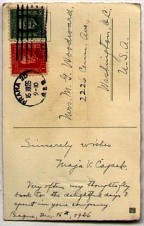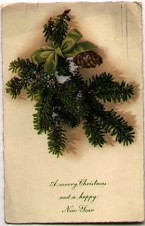Product Information
VERY RARE AUTOGRAPH/
Maja V. Capek – born in Bohemia and came to the United States in 1907. She studied library science at Columbia University and in 1914 was put in charge of the Czechoslovak Department of the New York Public Library. There she met Norbert Capek who was studying for a Ph.D. at City College. They were married in 1917 and moved to Belleville where Capek became pastor of a small congregation. But in 1919, having come to the conclusion that he could no longer be a Baptist, he resigned his pastorate. At the end of World War I, the Austro-Hungarian Empire fell apart and Czechoslovakia became independent. The Capeks, like other war refugees, were eager to return to their home country and play a part in its spiritual reawakening. By February 1922, the Capeks, working as team, had organized the Prague Congregation of Liberal Religious Fellowship. Almost immediately, the services were drawing standing-room-only crowds. In 1926, Maja was also ordained as a Unitarian minister. On June 24, 1923, the first Flower Festival was celebrated. This ritual now celebrated annually by UU congregations the world over, originated in the Prague Congregation. In 1939 Maja Capek left for the United States for what was supposed to be a brief lecture tour to raise funds for a joint Unitarian and Society of Friends program to assist endangered refugees and internees. She brought the Flower Festival Service with her and it was celebrated for the first time in the United States at the First Unitarian Church in Cambridge, Massachusetts, in the spring of 1940. Tragically, the Germans took Czechoslovakia while Maja was still on tour, which prevented her from returning to Prague. She stayed in Massachusetts during the war working at the church in New Bedford. As soon as the Nazi army took over Czechoslovakia, Capek became a marked man. He was interrogated by the Gestapo, whose spies listened to every word he preached. For a time he veiled his message of freedom in Biblical parables and religious symbolism, and for a while it worked. Then, on March 28, 1941, Capek and his youngest daughter Zora were arrested by the Gestapo. They were convicted of listening to foreign radio broadcasts, a treasonous offence. Norbert Capek be sent to the concentration camp at Dachau. In 1942 he was sent on an “invalid transport,” and evidently killed that day either with poison gas or a lethal injection, although his official death certificate states that he died October 30 of a cerebral hemorrhage. Maja Capek did not learn of Norbert’s death until after the war. Leadership of the Prague church passed to the Capeks’ daughter and son-in-law, both ordained Unitarian ministers. Maja decided to work to help the victims of the war and joined the staff of the United Nations Relief and Rehabilitation Agency. She worked for a number of years as a Displaced Persons Specialist in Egypt and Palestine. Those who knew her described her as possessing tremendous drive and determination combined with a sensitive and loving heart-another fire flower blooming in the burned-out places of the world. She died in 1966. Offered here is is a rare ANS, written from Christmas postcard postmarked Praha, Czechoslovakia. To Mrs. M.G. Woodward, wife of Robert, who had died in 1924. She writes – “Sincerely wishes Maja V. Capek. Very often my thoughts fly back to the delightful days I spent in your company. Prague, Dec. 16th, 1926.” VG. RARE!..
Designed by Website Designers Nottingham | Powered by Wordpress




